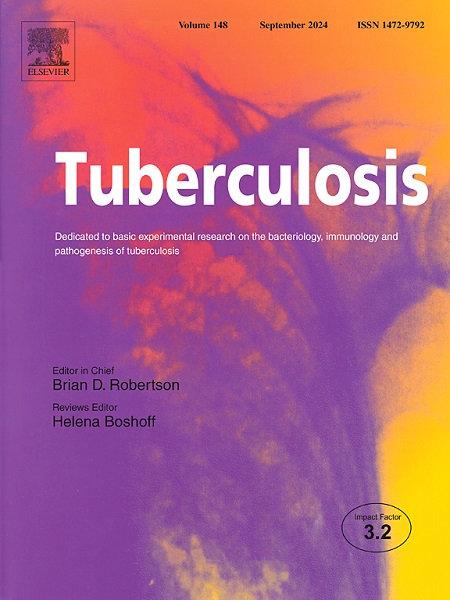M. bovis FadR mutant exhibits an altered colony morphotype and increased virulence
IF 2.9
3区 医学
Q3 IMMUNOLOGY
引用次数: 0
Abstract
FadR, a GntR family transcriptional regulator, is known to maintain fatty acid homeostasis in prokaryotes. In this study, a fadR deletion mutant was generated in Mycobacterium bovis, which exhibited distinct morphological changes, along with enhanced permeability and increased antibiotic susceptibility. Interrupted cell-wall homeostasis often leads to such collateral phenotype. To gain insight into the lipid profile, we conducted lipidomics analysis, which revealed that the levels of DAT and PAT were higher in the mutant, while keto-mycolate methyl esters were lower. Further, key proteins responsible for altered phenotypes and lipid profiles were identified using a comparative proteomics approach between M. bovis and the ΔfadR mutant. In addition to lipid metabolism, several intermediary metabolic and stress response proteins predicted to have roles in the growth, survival, and pathogenicity of mycobacteria were also altered in the mutant. Notably, deletion of fadR led to hypervirulence in the animal model. Taken together, this study establishes a crucial role of FadR in the survival of mycobacteria by regulating lipid metabolism, providing insights into its potential as a target for therapeutic strategies against slow-growing mycobacteria.
牛分枝杆菌FadR突变体表现出改变的菌落形态和增加的毒力
FadR是一种GntR家族转录调节因子,已知在原核生物中维持脂肪酸稳态。在这项研究中,牛分枝杆菌产生了一个fadR缺失突变体,该突变体表现出明显的形态变化,同时通透性增强,抗生素敏感性增加。细胞壁稳态的中断常常导致这种侧枝表型。为了深入了解脂质谱,我们进行了脂质组学分析,结果显示突变体中DAT和PAT的水平较高,而酮-真菌酸甲酯的水平较低。此外,使用比较蛋白质组学方法鉴定了牛分枝杆菌和ΔfadR突变体之间表型和脂质谱改变的关键蛋白。除了脂质代谢外,在分枝杆菌的生长、存活和致病性中起作用的几种中间代谢和应激反应蛋白也在突变体中发生了改变。值得注意的是,在动物模型中,fadR的缺失导致了高毒力。综上所述,本研究确定了FadR通过调节脂质代谢在分枝杆菌存活中的关键作用,为其作为治疗缓慢生长的分枝杆菌的治疗策略提供了潜在的见解。
本文章由计算机程序翻译,如有差异,请以英文原文为准。
求助全文
约1分钟内获得全文
求助全文
来源期刊

Tuberculosis
医学-呼吸系统
CiteScore
4.60
自引率
3.10%
发文量
87
审稿时长
49 days
期刊介绍:
Tuberculosis is a speciality journal focusing on basic experimental research on tuberculosis, notably on bacteriological, immunological and pathogenesis aspects of the disease. The journal publishes original research and reviews on the host response and immunology of tuberculosis and the molecular biology, genetics and physiology of the organism, however discourages submissions with a meta-analytical focus (for example, articles based on searches of published articles in public electronic databases, especially where there is lack of evidence of the personal involvement of authors in the generation of such material). We do not publish Clinical Case-Studies.
Areas on which submissions are welcomed include:
-Clinical TrialsDiagnostics-
Antimicrobial resistance-
Immunology-
Leprosy-
Microbiology, including microbial physiology-
Molecular epidemiology-
Non-tuberculous Mycobacteria-
Pathogenesis-
Pathology-
Vaccine development.
This Journal does not accept case-reports.
The resurgence of interest in tuberculosis has accelerated the pace of relevant research and Tuberculosis has grown with it, as the only journal dedicated to experimental biomedical research in tuberculosis.
 求助内容:
求助内容: 应助结果提醒方式:
应助结果提醒方式:


